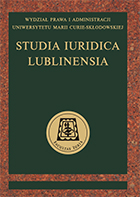Orzecznictwo Sądu Najwyższego Stanów Zjednoczonych jako autonomiczne źródło tworzenia norm konstytucyjnych
The Supreme Court of the United States as an Autonomous Source of Constitutional Norms
Author(s): Andrzej BrykSubject(s): Anthropology, Constitutional Law, Human Rights and Humanitarian Law, Political Philosophy, Politics and law, Sociology of Law, Ontology
Published by: Wydawnictwo Naukowe Uniwersytetu Marii Curie-Sklodowskiej
Keywords: United States Constitution; Supreme Court of the USA; constitutional rights; judicial activism; liberal anthropology; judicial statutory construction; creation of law;
Summary/Abstract: The landmark decisions of the Supreme Court change the ethos of adjudicating. The substantive due process doctrine allowed the Court to become an actual lawgiver. This doctrine widely extended the understanding of the due process clause of the 5th and 14th Amendments. Increased power of statutory construction corresponded with the doctrine of loose constructionism (living constitution). Decisions like Griswold v. Connecticut and Roe v. Wade created new constitutional rights, emanating from the radical liberal anthropology. Adjudication became a field of an ideological battle in the culture war over anthropology determining the law’s content. In the classical and Christian understanding, being free is considered as having one’s identity discovered as an ontological constant, thus allowing an individual to develop himself according to the nature’s essence. The liberal anthropological revolution defines freedom as a power of self-creation, serving individual’s preferences. The liberal elites, employing ideas of social engineering, attempt to enforce rules based on coexistence and relationship of equal rights. Individual rights emanate from the autonomous, personal choice of life values, the key of the constitutional interpretation. The wider this right of self-definition, the wider the scope of the state’s intervention. In Griswold v. Connecticut the right to privacy signified deep cultural change rooted in such an anthropology. This “emancipation project” is thus built on an axiology destroying relations, becoming a kind of a religion of secular salvation. The state serves here as a demiurge and is sacralized. This causes an increasing abyss between the elites and the rest of the citizens, with a corresponding social disintegration of it’s public life. For instance Obergefell v. Hodges enforces a new anthropological definition of marriage, beginning to delegitimize creeds and actions of religious communities. This reflects a global phenomenon of connecting individual liberal rights with politics of identity and the post-modern culture of right understood as autonomous will without reasoning about its ontological, universal basis. The Supreme Court decisions are not separated from wider culture, but based on the new anthropological understanding of man as a consumer, with his individual will becoming the very basis of rights.
Journal: Studia Iuridica Lublinensia
- Issue Year: 25/2016
- Issue No: 3
- Page Range: 119-137
- Page Count: 19
- Language: Polish

